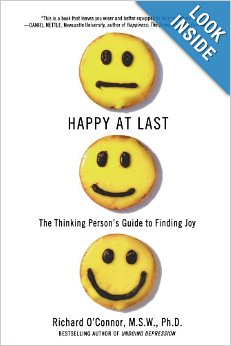 I was a motivational speaker for a group of school administrators where the other guest speaker quoted the book, Happy at Last by Dr Richard O'Connor.
I was a motivational speaker for a group of school administrators where the other guest speaker quoted the book, Happy at Last by Dr Richard O'Connor.
I have quoted Dr Richard in a couple of motivational speeches in the past, so I went out and reread some of the chapters in the book. Below are the important refreshers to remember on your quest to be happy.
As the guest speaker reminded us, some people are naturally happier than others. The best predictor of a persons happiness at the start and end of life is your genes.
Genes account for about 50% of a person's happiness set point. Genes are turned on by experience and they are changed by our experiences.
The book, Happy at Last suggest that the brain is changed by experience. Every time you smile you make it a little easier to smile more. Happiness doesn't come naturally, though we assume it should, but it can be learned.
The pleasure system is triggered by opioids, whose job is to tune out other stimuli and focus on pleasure.
The system of desire is triggered by dopamine and tells us what we want. Once we get what we want, we relieve the desire. Thus, the happiness system is faulty and fleeting because once we achieve what we want -we cease to be happy.
The purpose of happiness is to keep us striving which keeps us alive. To achieve long term happiness you have to outsmart your own genes. Getting what you want gives you satisfaction but only until you get it.
As the guest speaker suggested in his motivational speech, practicing mindfulness is our best hope of increasing happiness.
Some problems can't be solved, like anger, fear, jealousy; so we are always in fight or flight mode. In a quest to react to the stress in our environment we may assume things have to do with us ; when actually it doesn't. Thus, we redouble our efforts to improve ourselves which makes it even worse. It shines a light on self recrimination.
People devote so much of the mind to trying to improve. Therapy doesn't eliminate fear and doubt ; instead it makes changes in behavior that start to show you that you don't have to be fearful.
Feelings follow behavior.
Mindfulness is being present, detached and not being caught up in irrational fears. Regular meditation helps build mindfulness. Noticing where your thoughts go when you are not paying attention, gives you clues to what is frightening and consuming you.
Mindfulness creates a detachment from endless striving. Meditation teaches you a detached way to view the way you think, your fears, jealousy and worry.
We may spend our days always fighting our inner critic thus suffering a lack of validation. Meditation ultimately allows you to explore our deeper self in the brain.
Mindfulness teaches non judgmental acceptance.
The guest speaker compelled the audience to ponder the question.... Are you happier then your grandparents were at your age? My instant analysis says yes, simply because we have better life experiences and a higher standard of living. The fact that we now know this mind altering research arms us with tools to increase our happiness.
Laughter therapy.
I enjoyed being a motivational speaker for the school administrators, they were a very " happy" group. I presented the motivational speech, This Would be Funny if it Wasn't Happening to Me!


